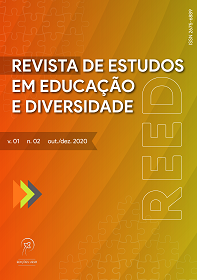NUEVAS TECNOLOGÍAS EN LAS CONDICIONES POST-MÉTODO
DOI:
https://doi.org/10.22481/reed.v1i2.7668Palabras clave:
Nuevas tecnologías, Alfabetización digital, Condición posterior al método, Enseñanza-aprendizajeResumen
En este artículo presentamos una mirada dialógica entre la importancia de las nuevas tecnologías en la enseñanza y las perspectivas de la condición post-método (KUMARAVADIVELU, 2008). A partir de estudios de alfabetización digital (RIBEIRO, 2009; SOARES, 2002) y considerando la evolución de la cibercultura, discutimos la diversidad de métodos y modelos de enseñanza-aprendizaje, con el fin de proponer una discusión sobre la emergencia de diferentes desafíos en la enseñanza y el aprendizaje. señalar caminos para la convergencia de enfoques que respondan a las demandas de la sociedad de la información. Al final de este artículo, presentamos las pautas de investigación con nuevas alfabetizaciones propuestas por Lankshear y Knobel (2013), que pueden servir como parámetro para trabajar con nuevas tecnologías en la condición post-método
Descargas
Citas
BALADELI, Ana Paula; FERREIRA, Aparecida de Jesus. A Interface Linguagem e Tecnologia: um olhar a partir dos novos estudos do letramento. Revista Travessias, v. 6, n. 1, p. 463-475, 2012. Disponível em: http://e-revista.unioeste.br/index.php/travessias/article/view/6083. Acesso em: 10 mai. 2020.
BRASIL. Orientações Curriculares para o Ensino Médio: linguagens, códigos e suas tecnologias. Secretaria de Educação Básica. Brasília: Ministério da Educação, 2006.
BOTELHO, Flávia Girardo. A Construção do Letramento Digital em Crianças em Fase de Alfabetização. 2013. Tese (Doutorado em Letras) - Centro de Artes e Comunicação, Universidade Federal de Pernambuco, Recife, 2013.
FREIRE, Paulo. Pedagogia da autonomia: saberes necessários à prática educativa. São Paulo: Editora Paz e Terra, 1966.
FREIRE, Paulo. Educação como prática da liberdade. Rio de Janeiro: Editora Paz e Terra, 1967.
FONSECA, Hejaine de Oliveira. Navegar é Preciso: a internet como ferramenta suplementar na leitura e escrita de inglês. Uberlândia: 2007.
KALINKE, Marco Aurélio. Para não ser um Professor do Século Passado. Curitiba: Gráfica Expoente, 1999.
KUMARAVADIVELU, B. Understanding language teaching: from method to postmethod. Mahwah: Tayor & Francis e-Library, 2008.
LANKSHEAR, Colin; KNOBEL, Michele. A new literacies reader: educational perspectives/edited by Colin Lankshear, Michele Knobel. New York: Peter Lang, 2013
.
LEFFA, Vilson José. O ensino do inglês no futuro: da dicotomia para a convergência. In: STEVENS, Cristina Maria Teixeira; CUNHA, Maria Jandyra Cavalcanti. Caminhos e colheita: ensino e pesquisa na área de inglês no Brasil. Brasília: Editora UnB, 2003. p. 225-250.
LEMOS, André. Cibercutura, cultura e identidade. Contemporânea - Revista de comunicação e cultura, v. 2, n. 2, p. 9-22, dez. 2004. Disponível em: https://periodicos.ufba.br/index.php/contemporaneaposcom/article/%0bviewFile/3416/2486. Acesso em: 16 jun. 2020.
LÉVY, Pierre. Cibercultura, Rio de Janeiro: Editora 34, 1999.
MAGNABOSCO, Gislaine Gracia. Hipertexto e gêneros digitais: modificações no ler e escrever? Conjectura, Caxias do Sul, v. 14, n. 2, p. 48-63, maio/ago. 2009. Disponível em: http://www.ucs.br/etc/revistas/index.php/conjectura/article/view/14/13. Acesso em: 16 jun. 2020.
MOREIRA, Carla. Letramento digital: do conceito à prática. Anais do SIELP. Volume 2, Número 1. Uberlândia: EDUFU, 2012.
MORIN, Edgar. Os sete saberes necessários à educação do futuro. São Paulo/Brasília: Cortez/UNESCO, 2000.
PRETTO, Nelson de Luca. O desafio de educar na era digital: Educações. Revista Portuguesa de Educação, v. 24, n. 1, p. 95-118, 2011. Disponível em: https://revistas.rcaap.pt/rpe/article/view/3042. Acesso em: 19 mai. 2020.
RIBEIRO, Ana Elisa. Letramento Digital: um tema em gêneros efêmeros. Revista da ABRALIN, v.8, n.1, p. 15-38, jan./jun. 2009. Disponível em: https://pdfs.semanticscholar.org/be28/c5033d13cbdd99acfa2e58a2116dafb15bec.pdf. Acesso em: 23 jul. 2020.
SOARES, Magda. Novas práticas de leitura e escrita: letramento na cibercultura. Educação & Sociedade, Campinas, v. 23, n. 81, p. 143-160, dez. 2002. Disponível em: https://www.scielo.br/pdf/es/v23n81/13935.pdf. Acesso em: 23 jul. 2020.
VALENTE, José Armando. Aprendendo para a Vida: o uso da informática na educação especial. In: FREIRE, Fernanda Maria Pereira; VALENTE, José Armando. (Orgs.). Aprendendo para a vida: os computadores na sala de aula. São Paulo: Cortez, 2001, p. 41-53.
Descargas
Publicado
Cómo citar
Número
Sección
Licencia
Usted es libre de:
Compartir — copiar y redistribuir el material en cualquier medio o formato; Adaptar — remezclar, transformar y construir a partir del material para cualquier propósito, incluso comercialmente. Esta licencia es aceptable para Obras Culturales Libres. La licenciante no puede revocar estas libertades en tanto usted siga los términos de la licencia.
Bajo los siguientes términos:
Atribución — Usted debe dar crédito de manera adecuada, brindar un enlace a la licencia, e indicar si se han realizado cambios. Puede hacerlo en cualquier forma razonable, pero no de forma tal que sugiera que usted o su uso tienen el apoyo de la licenciante.
No hay restricciones adicionales — No puede aplicar términos legales ni medidas tecnológicas que restrinjan legalmente a otras a hacer cualquier uso permitido por la licencia.






